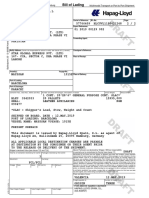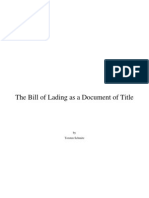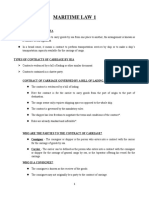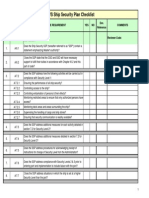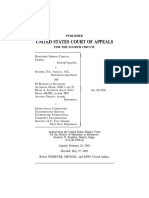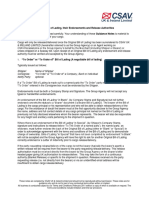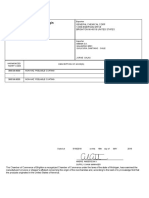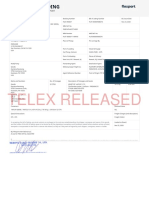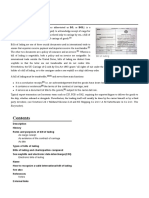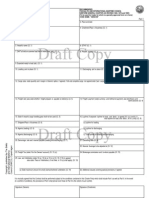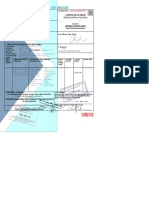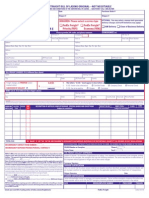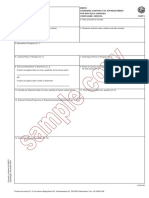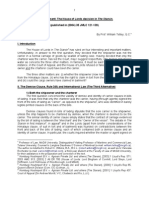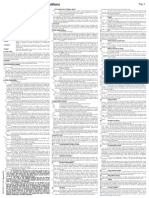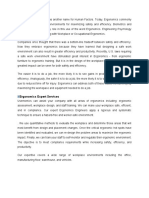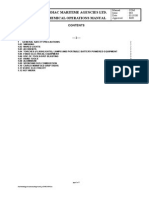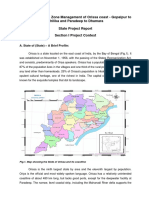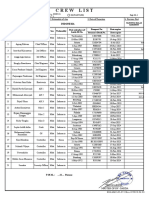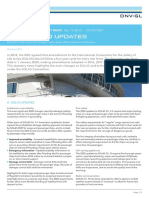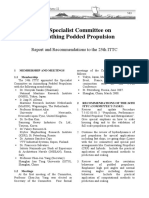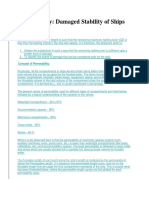Bill of Lading
Bill of Lading
Uploaded by
zubinpujaraCopyright:
Available Formats
Bill of Lading
Bill of Lading
Uploaded by
zubinpujaraCopyright
Available Formats
Share this document
Did you find this document useful?
Is this content inappropriate?
Copyright:
Available Formats
Bill of Lading
Bill of Lading
Uploaded by
zubinpujaraCopyright:
Available Formats
Bill of Lading · Terms and Conditions Page 1
1. Definitions the Carriage unless suit is brought within one (1) year after delivery of the Goods or the date when (2) Freight has been calculated and must be paid on the basis of particulars furnished by or on
“Carrier” means the party named on page 2 of this Bill of Lading. the Goods should have been delivered. behalf of the Shipper. If the particulars furnished by or on behalf of the Shipper are incorrect,
7. Sundry Liability Provisions liquidated damages must be paid to the Carrier, in accordance with the applicable Tariff.
“Carriage” means the whole or any part of the operations and services undertaken
by the Carrier in respect of the Goods covered by this Bill of Lading. (3) All Freight shall be paid without any set-off or counterclaim unless the claim is not in dispute or
(1) Hague Rules/Hague-Visby Rules confirmed by final court decision.
“Hague Rules” means the provisions of the International Convention for the Unification In the event that suit is brought in a court other than the court as provided for in Clause 25 and
of Certain Rules relating to Bills of Lading signed at Brussels on 25th (4) If the Merchant fails to pay the Freight when due, he shall be liable for all costs, liquidated
such court contrary to Clause 25 accepts jurisdiction, then the Hague-Visby Rules are damages in accordance with the applicable Tariff and in particular interest which accrue until
August, 1924 without the amendments by the Protocol signed at Brussels compulsorily applicable, if this Bill of Lading has been issued in a country where the Hague-Visby
on 23rd February, 1968. payment.
Rules are compulsorily applicable and the Carrier’s liability shall not exceed 2 SDRs per kilo of
“Hague-Visby Rules” means the provisions of the International Convention for the Unification gross weight of the Goods lost or damaged; if this Bill of Lading has been issued in a country in 15. Lien
of Certain Rules relating to Bills of Lading signed at Brussels on 25th which the Hague Rules apply the Carriers’ liability shall not exceed GBP 100 per package or unit. The Carrier shall have a lien on the Goods and any documents relating thereto for all sums
August, 1924 and includes the amendments by the Protocol signed at (2) COGSA payable by the Merchant to the Carrier under this or any other contract and for General Average
Brussels on 23rd February, 1968. Notwithstanding any of the foregoing to the contrary, in the event that suit is brought in a contributions, to whomsoever due. The Carrier may exercise his lien at any time and in any
“Merchant” includes the Shipper, Holder, Consignee, Receiver of the Goods or of this court in the USA and such court, contrary to Clause 25, accepts jurisdiction, then COGSA shall place at his sole discretion. The Carrier has the right to sell the Goods at public or private sale
Bill of Lading, any Person owning or entitled to the possession of the Goods be compulsorily applicable to this contract of carriage if this Bill of Lading covers a shipment to without notice to the Merchant. If the proceeds of this sale fail to cover the whole amount due, the
or this Bill of Lading. or from the USA. The provisions set forth in COGSA shall also govern before the Goods Carrier is entitled to recover the deficit from the Merchant.
“Servants or Agents” includes the Master, Officers and crew of the vessel, owners, managers loaded on or after they are discharged from the vessel. The Carrier’s maximum liability in respect 16. Optional Stowage and Deck Cargo
and operators of vessels (other than the Carrier), underlying carriers, to the Goods shall not exceed USD 500 per package or, where the Goods are not shipped in (1) The Goods may be packed by the Carrier in Containers and consolidated with other goods in
sub-contractors, stevedores, terminal and groupage operators, road and packages, USD 500 per customary freight unit unless the nature and value of the Goods has Containers.
rail transport operators and any independent contractors employed by the been declared by the Merchant and inserted in writing on page 2 of the Bill of Lading and said (2) Goods, whether or not packed in Containers, may be carried on deck or under deck without
Carrier in the performance of the Carriage. Merchant shall have paid the applicable ad valorem freight rate set forth in Carrier’s Tariff. notice to the Merchant. All such Goods whether carried on deck or under deck, shall participate
“Goods” means the whole or any part of the cargo received from the Shipper and (3) Shipper’s declared value in general average.
includes any equipment or Container not supplied by or on behalf of the The Merchant agrees and acknowledges that the Carrier has no knowledge of the value of the
Carrier. Goods and that compensation higher than that provided for herein, may not be claimed unless 17. Methods and Routes of Carriage
“Container” includes any container, trailer, transportable tank, flat, or any similar the nature and value of such Goods have been declared by the Merchant, agreed to by the (1) The Carrier may at any time and without notice to the Merchant:
article used to consolidate goods and any equipment thereof or connected Carrier and inserted into the Bill of Lading before shipment. In addition the applicable ad valorem (a) use any means of carriage whatsoever, including the utilisation of railway, road vehicle or
thereto. freight rate as set out in the Carrier’s Tariff must be paid. Any partial loss or damage shall be inland river services
“Freight” includes all charges payable to the Carrier in accordance with the adjusted pro rata on the basis of such declared value. If the declared value is higher than the (b) transfer the Goods from one conveyance to another, including but not limited to transhipping
applicable Tariff and this Bill of Lading. actual value, the Carrier shall in no event be liable to pay compensation higher than the net or carrying them on another vessel than that named on page 2
Wherever USA is mentioned this includes the United States of America and the territories where the invoice value of the Goods plus freight and insurance. Any references to letters of credit, import (c) unpack and remove Goods which have been packed into a Container and forward them in a
United States Carriage of Goods by Sea Act (COGSA) is applicable. licenses, sales contracts, invoices or order number and/or details of any contract to which Container or otherwise
the Carrier is not a party when shown on page 2 of this Bill of Lading shall not be regarded as a (d) proceed by any route in his discretion (whether or not the nearest or most direct or
2. Carrier’s Tariff declaration of value. customary or advertised route), at any speed, and proceed to or stay at any place or port
The terms and conditions of the Carrier’s applicable Tariff are incorporated herein, with particular (4) Limitation of Liability whatsoever, once or more often and in any order
attention drawn to the terms and conditions relating to containers and vehicle demurrage. The
provisions relevant to the applicable Tariff can be acquired from the Carrier or his Agents upon It is hereby agreed by the Merchant, that the Carrier qualifies as a person entitled to limit (e) load or unload the Goods at any place or port (whether or not such port is named on page 2
request. The Carrier’s standard Tariff, can be accessed on-line at www.hapag-lloyd.com. In the liability under any Convention or Act pertaining to limitation of liability on maritime claims, as the Port of Loading or Port of Discharge) and store the Goods temporarily at any place or
case of any inconsistency between this Bill of Lading and the applicable Tariff, this Bill of Lading whichever is applicable. The Carrier may be the shipowner, charterer (including a slot-charterer), port whatsoever, once or more often.
shall prevail, except in cases relating to Freight. manager or operator of the ship, or salvor rendering services in connection with salvage (2) Anything done in accordance with Clause 17 (1) or any delay arising therefrom shall be deemed
operations. If any claims are made against the Servants or Agents, they are entitled to avail to be within the contractual Carriage and shall not be a deviation.
3. Warranty themselves of the same limitation available to the Carrier.
The Merchant warrants that in agreeing to the Terms and Conditions hereof he is, or has the 18. Matters Affecting Performance
(5) Delay If at any time the Carriage is or is likely to be affected by any hindrance, risk, delay, difficulty or
authority of, the Person owning or entitled to the possession of the Goods and this Bill of Lading. Unless expressly agreed, the Carrier does not undertake that the Goods shall arrive at the disadvantage of any kind including war, civil commotion, political unrest, act of terrorism and
4. Sub-Contracting and Indemnity Port of Discharge or Place of Delivery at any particular time or to meet any particular market or threat thereof and howsoever arising (even though the circumstances giving rise to such
(1) The Carrier shall be entitled to sub-contract the Carriage on any terms whatsoever. use, and the Carrier shall in no circumstances whatsoever and howsoever arising be liable hindrance, risk, delay, difficulty or disadvantage existed at the time this contract was entered into
(2) It is hereby agreed that no Servants or Agents are, or shall be deemed to be liable with respect for direct, indirect or consequential loss or damage caused by delay. If notwithstanding the or when the Goods were received for Carriage), the Carrier (whether or not the Carriage is
to the Goods as Carrier, bailee or otherwise. If, however, it shall be adjudged that any other than foregoing the Carrier is held responsible for the consequences of any delay, the Carrier’s commenced) may, without prior notice to the Merchant and at the sole discretion of the Carrier,
the Carrier is carrier or bailee of the Goods or under any responsibility with respect thereto, all liability is limited to an amount equal to three times the Freight under the Contract of Carriage. either:
exemptions and limitations of and exoneration from liability provided by law or by the Terms and (6) Scope of Application and Exclusions (1) carry the Goods to the contracted Port of Discharge or Place of Delivery, whichever is
Conditions including the jurisdiction clause shall be available to such Servant or Agent. If any (a) The rights, defenses, limitations and liberties of whatsoever nature provided for in this applicable, by an alternative route to that indicated in this Bill of Lading or that which is usual
claim is made against any of the Servants or Agents, the Merchant shall indemnify the Carrier Bill of Lading shall apply in any action against the Carrier for loss or damage or delay, for Goods consigned to that Port of Discharge or Place of Delivery and he shall be entitled to
against all consequences thereof. howsoever occurring and whether the action be founded in contract or in tort. charge such additional Freight; or
(3) The provisions of Clause 4 (2), shall extend to claims of whatsoever nature against other (b) Save as otherwise provided herein, the Carrier shall in no circumstances whatsoever and (2) suspend the Carriage of the Goods and store them ashore or afloat and endeavour to forward
persons chartering space on the carrying vessel. howsoever arising be liable for direct or indirect or consequential loss or damage or loss of them as soon as possible and he shall be entitled to charge storage costs and additional
profits. The Merchant shall indemnify the Carrier against any customs liabilities even if Freight; or
5. Carrier’s Responsibility caused by loss of the goods.
(1) Port to Port Shipment (3) abandon the Carriage of the Goods and place them at the Merchant’s disposal at any place
(a) When loss or damage has occurred between the time of loading of the Goods by the Carrier 8. Shipper-Packed Containers or port which the Carrier may deem safe and convenient, whereupon the responsibility of the
at the Port of Loading and the time of discharge by the Carrier at the Port of Discharge, the If a Container has not been packed by or on behalf of the Carrier: Carrier in respect of such Goods shall cease. The Merchant shall pay any additional costs of
responsibility of the Carrier shall be determined in accordance with German law making (1) the Carrier shall not be liable for loss of or damage to the Goods caused by: the Carriage to, and delivery and storage at, such place or port.
the Hague-Visby Rules compulsorily applicable to the Bill of Lading. In the event the (a) the manner in which the Container has been packed or 19. Dangerous Goods
Bill of Lading has been issued in Germany or a country in which the Hague Rules are (b) the unsuitability of the Goods for Carriage in the Container supplied or (1) No Goods which are or may become dangerous, inflammable or damaging (including radio-
compulsorily applicable and this Bill of Lading covers a shipment from or to Germany and (c) the unsuitability or defective condition of the Container or the incorrect setting of any active materials), shall be tendered to the Carrier for Carriage without his express consent in
such aforesaid country or between such aforesaid countries, the responsibility of the refrigeration controls thereof, provided that, if the Container has been supplied by or on writing, and without the Container as well as the Goods themselves being distinctly marked on
Carrier shall be determined in accordance with German law, making the Hague Rules behalf of the Carrier, this unsuitability or defective condition would have been apparent upon the outside so as to indicate the nature and character of any such Goods and so as to comply
compulsorily applicable. inspection by the Merchant at or prior to the time when the Container was packed or with any applicable laws, regulations or requirements. If any such Goods are delivered to the
(b) Howsoever the Carrier shall be under no liability whatsoever for loss of or damage to (d) packing refrigerated Goods that are not at the correct temperature for Carriage. Carrier without such written consent and/or marking, or if in the opinion of the Carrier the Goods
the Goods occurring, if such loss or damage arises prior to loading on or subsequent to (2) the Merchant shall indemnify the Carrier against any loss, damage, liability or expense are or are likely to become of a dangerous, inflammable or damaging nature, they may at any
the discharge from the vessel. Notwithstanding the above, in the event that the whatsoever and howsoever arising caused by one or more matters referred to in Clause 8 (1). time be destroyed, disposed of, abandoned, or rendered harmless without compensation to the
applicable compulsory law provides the contrary, the Carrier shall have the benefit of (3) with regard to refrigerated cargoes, the Carrier shall be deemed to have fulfilled his obligations Merchant.
every right, defence, limitation and liberty in the Hague-Visby Rules or the Hague Rules, under the Contract of Carriage and shall have no liability whatsoever if such refrigerated Goods (2) The Merchant warrants that the Goods are suffiently packed in compliance with all laws or
notwithstanding that the loss or damage did not occur after loading on or after discharge are carried in a range of plus or minus 2,5 degrees centigrade in regard to any temperature regulations and requirements with regard to the nature of the Goods.
from the vessel. In the event that the Bill of Lading covers a shipment to or from the indicated on page 2 of this Bill of Lading. The term “apparent good order and condition” when (3) Whether or not the Merchant was aware of the nature of the Goods, the Merchant shall
USA, however, COGSA shall be applicable before the Goods are loaded on or after they are used in this Bill of Lading with reference to the Goods which require refrigeration does not mean indemnify the Carrier against all claims, losses, damages or expenses arising in consequence
discharged from the vessel. that the Goods when received were verified by the Carrier as being at the temperature on page of the Carriage of such Goods.
(c) Unless notice of loss or damage be given in writing to the Carrier or his agent at the Port of 2 of this Bill of Lading. (4) Nothing contained in this Clause shall deprive the Carrier of any of his rights provided for
Discharge before or at the time of the removal of the Goods into the custody of the person Where a temperature is indicated the Carrier undertakes that the Container is equipped to elsewhere.
entitled to delivery thereof under the contract of carriage, or, if the loss or damage is not maintain the temperature set by the Merchant. The Merchant remains responsible for the
apparent, within three (3) days, such removal shall be prima facie evidence of the delivery 20. Notification and Delivery
consequences of any temperature irregularities prior to receipt or after delivery by the Carrier. (1) Any failure to give notification of the arrival of the goods shall not involve the Carrier in any
by the Carrier as described in this Bill of Lading and any such loss or damage which may (4) Container with Goods packed by the Merchant shall be delivered to the Carrier with an intact
have occurred to the Goods shall be deemed to be due to circumstances which are not the liability nor relieve the Merchant of any obligation hereunder.
high security seal in place, and the seal number noted in writing on this Bill of Lading by (2) The Merchant shall take delivery of the Goods within the time provided for in the Carrier’s
responsibility of the Carrier. The notice must clearly specify the damage. Notwithstanding the Merchant. In the event the Container is not so sealed, the Carrier reserves the right, at
the aforesaid, if a container has been delivered to the Merchant, the Merchant must prove applicable Tariff. If the Merchant fails to do so the Carrier shall be entitled, without notice,
Merchant's expense, to return the Container to the Merchant for resealing, or to affix a seal. to unpack the Goods if packed in Containers and/or to store the Goods ashore, afloat, in
that the damage to or loss of the Goods did not occur during the period after delivery, when
the container was in the custody of the Merchant. 9. Inspection of Goods the open or under cover, at the sole risk of the Merchant. Such storage shall constitute due
(d) Compensation shall be calculated by reference to the value of the Goods at the place and The Carrier or any Person to whom the Carrier has sub-contracted the Carriage or any Person delivery hereunder, and thereupon the liability of the Carrier in respect of the Goods stored as
the time they are delivered to the Merchant, or at the place and the time they should have authorized by the Carrier shall be entitled, but under no obligation, to open any Container or aforesaid shall wholly cease, and and the Merchant shall be responsible for the costs of such
been delivered. For the purpose of determining the extent of the Carrier’s liability for loss of package at any time and to inspect the Goods. If, by order of the authorities at any place, a storage, as well as detention and demurrage.
or damage to the Goods, the sound value of the Goods is agreed to be the invoice value plus Container has to be opened for the Goods to be inspected, the Carrier will not be liable for any loss (3) If the Merchant fails to take delivery of the Goods within thirty days of delivery becoming
freight and insurance if paid. or damage incurred as a result of such opening, unpacking, inspection or repacking. The Carrier due under Clause 20 (2), or if in the opinion the Carrier they are likely to deteriorate, decay,
(e) In the event that the Bill of Lading has been issued in the USA or in a country making the shall be entitled to recover the costs of such opening, unpacking, inspection and repacking from become worthlessor incur charges whether for storage or otherwise in excess of their value, the
Hague Rules applicable and this Bill of Lading covers a shipment from or to the USA COGSA the Merchant. Carrier may, without prejudice to any other rights which he may have against the Merchant,
shall apply. COGSA shall also be applicable before the goods are loaded on or after they are 10. Carriage Affected by Condition of Goods without notice sell, destroy or dispose of the Goods and apply any proceeds of sale in reduction
discharged from the vessel. If it appears at any time that, due to their condition, the Goods cannot safely or properly be carried of the sums due to the Carrier from the Merchant.
(2) Multimodal Transport further or without incurring additional expense or taking any measure(s) in relation to the Container (4) Without prejudice to an earlier termination by virtue of law or any other clause of this Bill of
(a) If the place of damage to or loss of the Goods is known, the responsibility of the Carrier is or the Goods, the Carrier may without notice to the Merchant take any measure(s) and/or incur any Lading the responsibility of the Carrier shall cease and the Goods shall be considered to be
determined by the law which applies to this leg of Carriage. additional expense to carry or to continue the Carriage thereof, and/or sell or dispose of the Goods, delivered at their own risk and expense in every respect when taken into the custody of
(b) In the event that part of the multimodal transport is a shipment to or from the USA and and/or abandon the Carriage and/or store them ashore or afloat, under cover or in the open, at any customs or other authorities.
the damage to or loss of the Goods occurs at the time between the loading at the Port of place, whichever the Carrier, in his absolute discretion, considers most appropriate, which 21. FCL Multiple Bills of Lading
Loading and the discharging at the Port of Discharge the responsibility of the Carrier shall abandonment, storage, sale or disposal shall be deemed to constitute due delivery under this Bill (1) Goods will only be delivered in a Container to the Merchant if all Bills of Lading in respect
be determined in accordance with German law making the Hague Rules compulsorily of Lading. The Merchant shall indemnify the Carrier against any additional expense so incurred. to the contents of the Container have been surrendered authorising delivery to a single
applicable. COGSA however applies before the Goods are loaded on or after they are 11. Description of the Goods Merchant at a single Place of Delivery. In the event that this requirement is not fulfilled the
discharged from the vessel. The Shipper warrants to the Carrier that the particulars relating to the Goods as set out on page 2 Carrier may unpack the Container and, in respect of Goods for which Bills of Lading have been
(c) With respect to road Carriage between countries in Europe liability shall be determined in have been checked by the Shipper on receipt of this Bill of Lading and that such particulars, and surrendered, deliver them to the Merchant on a LCL basis. Such delivery shall constitute due
accordance with the Convention on the Contract for the International Carriage of Goods any other particulars furnished by or on behalf of the Shipper, are adequate and correct. The delivery hereunder, but will only be effected against payment by the Merchant of LCL Service
by Road (CMR), dated May 19, 1956; and during rail Carriage between countries in Europe Shipper also warrants that the Goods are lawful Goods and contain no contraband. Charges and any charges appropriate to LCL Goods (as laid down in the Tariff) together with the
according to the International Agreement on Railway Transports (CIM), dated February 25, actual costs incurred for any additional services rendered.
1961 [or any amendments to this Convention or Agreement]. 12. Merchant’s Responsibility (2) If this is a FCL multiple Bill of Lading (as evidenced by the qualification of the tally acknowledged
(d) Unless notice of loss or damage be given in writing to the Carrier or his agent at the Port of (1) All the persons coming within the definition of Merchant in Clause 1 shall be jointly and on page 2 to the effect that it is “One of .... part cargoes in the Container”), then the Goods
Discharge before or at the time of the removal of the Goods into the custody of the person severally liable to the Carrier for the fullfillment of all obligatiions and warranties undertaken by detailed on page 2 are said to comprise part of the contents of the Container indicated. If the
entitled to delivery thereof under the contract of carriage, or, if the loss or damage is not the Merchant either in this Bill of Lading, or required by law. The Merchant shall indemnify the Carrier is required to deliver the Goods to more than one Merchant and if all or part of the total
apparent within seven (7) days, such removal shall be prima facie evidence of the delivery Carrier against all loss, damage, expenses and fines, arising or resulting from any breach of Goods within the Container consists of bulk Goods or unappropriated Goods, or is or becomes
by the Carrier as described in this Bill of Lading. The notice must clearly specify the damage. these obligations and warranties. mixed or unmarked or unidentifiable, the Holders of Bills of Lading relating to Goods within the
Notwithstanding the aforesaid, if a container has been delivered to the Merchant, the (2) The Merchant shall comply with all regulations or requirements of customs, ports and/or Container shall take delivery thereof (including any damaged portion) and bear any shortage in
Merchant must prove that the damage to or loss of the Goods did not occur during the other authorities and shall bear and pay all duties, taxes, fines, imposts, expenses or losses such proportions as the Carrier shall in his absolute discretion determine, and such delivery
period after delivery, when the container was in the custody of the Merchant. (including Freight for any additional Carriage) incurred or suffered by reason of any failure to so shall constitute due delivery hereunder.
(e) Compensation shall be calculated by reference to the value of the Goods at the time they comply, or by reason of any illegal, incorrect, or insufficient marking, number or addressing of the
Goods or the discovery of any drugs, narcotics, stowaways or other illegal substances within 22. General Average & Salvage
were delivered to the Carrier for Carriage. General average to be adjusted in any currency at any place selected by the Carrier and according
Containers packed by the Merchant or inside Goods supplied by the Merchant, or stamp duty
(f) IN THE EVENT THAT THE LAW WHICH IS APPLICABLE UNDER CLAUSE 5 (2) (a) IS NOT imposed by any country, and shall indemnify the Carrier in respect thereof. to the York/Antwerp Rules 1974 as amended in 1990 and 1994. Any period of time bar shall start
MANDATORY AND PROVIDES FOR LIABILITY EXCEEDING 2 SDRS PER KILO, THE to run from the date of the general average adjustment. Any claims and/or disputes relating to
90140745 L.V. 06/06 Printed 11/08
MAXIMUM LIABILITY SHALL BE 2 SDRS PER KILO. SDRS MEANS SPECIAL DRAWING (3) If Containers supplied by or on behalf of the Carrier are unpacked at the Merchant’s premises,
the Merchant is responsible for returning the empty Containers, with interiors brushed and general average shall exclusively subject to the Laws and Jurisdictions set out in Clause 25.
RIGHTS AS DEFINED BY THE INTERNATIONAL MONETARY FUND.
clean, to the point or place designated by the Carrier, his Servants or Agents, within the time 23. Both-to-Blame Collision
(g) IF THE STAGE OF THE CARRIAGE DURING WHICH LOSS OR DAMAGE OCCURRED IS NOT prescribed. Should a Container not be returned within the time prescribed in the Tariff, the Merchant
KNOWN, THE CARRIER’S MAXIMUM LIABILITY SHALL IN NO EVENT WHATSOEVER AND The Both-to-Blame Collision clause published by the Baltic and International Maritime Council
shall be liable for any detention, loss or expenses which may arise from such non-return. and obtainable from the Carrier or his agents upon request is hereby incorporated into this Bill of
HOWSOEVER ARISING EXCEED 2 SDRS PER KILO OF GROSS WEIGHT OF THE GOODS
LOST OR DAMAGED. 13. ISPS Code Lading.
(h) THE CARRIER SHALL NOT BE ENTITLED TO THE BENEFIT OF THE LIMITATION OF (1) The Merchant must comply with the requirements of the ISPS Code. If the Carrier is held liable 24. Validity
LIABILITY PROVIDED FOR IN CLAUSE 5 (2) (f) AND (g) IF IT IS PROVED THAT THE DAMAGE by any State Authority or any other third party the Merchant will indemnify and hold the Carrier In the event that anything herein contained is inconsistent with any applicable International
RESULTED FROM AN ACT OR OMMISSION OF THE CARRIER OR HIS SERVANTS DONE WITH harmless from any damages resulting from the violation of the ISPS Code by Merchant. Convention or national law which cannot be departed from by private contract, the provisions
INTEND TO CAUSE DAMAGE, OR RECKLESSLY AND WITH KNOWLEDGE THAT DAMAGE (2) The Merchant undertakes to pay the Carrier any costs or expenses whatsoever arising out hereof shall to the extent of such inconsistency but not further be null and void.
WOULD PROBABLY RESULT. HOWEVER; IF THE LOSS OR DAMAGE HAS OCCURRED of or related to security regulations or measures required by the Port Facility or any relevant Unless otherwise specifically agreed in writing between the Merchant and the Carrier, the Terms
DURING THE CARRIAGE OF GOODS BY SEA TO WHICH MARITIME LAW APPLIES, THE authority in accordance with the ISPS Code in relation to the Merchant’s cargo. and Conditions of this Bill of Lading supersede any prior agreements between Merchant and
CARRIER IS ENTITLED TO THE BENEFIT OF LIMITATION OF LIABILITY AS PROVIDED FOR (3) The Carrier is entitled to deviate the vessel to a different port and to unload the goods there if Carrier.
IN CLAUSE 5 (f) EXCEPT WHERE A LAW APPLIES MAKING THE HAGUE-VISBY RULES the authorities in the port of discharge have increased its level of security according to the ISPS
COMPULSORILY APPLICABLE AND IT IS PROVED THAT THE DAMAGE RESULTED FROM 25. Law and Jurisdiction
Code after the goods have been loaded.
AN ACT OR OMMISSION OF THE CARRIER WITH INTENT TO CAUSE DAMAGE; OR Except as otherwise provided specifically herein any claim or dispute arising under this Bill of
(4) The Merchant undertakes to compensate any costs and expenses suffered by the Carrier Lading shall be governed by the law of the Federal Republic of Germany and determined in the
RECKLESSLY AND WITH KNWOLEDGE THAT DAMAGE WOULD PROBABLY RESULT. because of a delay of the vessel resulting from a violation of the ISPS Code by the Merchant. Hamburg courts to the exclusion of the jurisdiction of the courts of any other place. In case the
6. Time for Suit 14. Freight Carrier intends to sue the Merchant the Carrier has also the option to file a suit at the Merchant’s
In any event, the Carrier shall be discharged from all liability in respect of loss of or damage to (1) Freight shall be deemed fully earned on receipt of the Goods by the Carrier and shall be paid place of business. In the event this clause is inapplicable under local law then jurisdiction and
the Goods, non-delivery, mis-delivery, delay or any other loss or damage connected or related to and non-returnable in any event. choice of law shall lie in either the Port of Loading or Port of Discharge at Carrier’s option.
You might also like
- BL DraftDocument1 pageBL DraftJesús Estuardo Olán Méndez100% (1)
- Wreck Removal Certificate - FlagDocument1 pageWreck Removal Certificate - FlagSherry GodwinNo ratings yet
- Crowley's Management System ManualDocument48 pagesCrowley's Management System ManualkstapletNo ratings yet
- Bill of Lading - SINA107552Document2 pagesBill of Lading - SINA107552Josh Fereira PNo ratings yet
- 195000341Document1 page195000341Usman S MalikNo ratings yet
- U.S. Customs Form: CBP Form 4630 - Petition For Relief From ForfeitureDocument2 pagesU.S. Customs Form: CBP Form 4630 - Petition For Relief From ForfeitureCustoms FormsNo ratings yet
- Bill of Lading: Bar Code SpaceDocument1 pageBill of Lading: Bar Code SpaceAndrea Lorente CortésNo ratings yet
- ITWX95617: Cartagena COL, Cartagena, ColombiaDocument1 pageITWX95617: Cartagena COL, Cartagena, ColombiaLaura Camila Romero MalagonNo ratings yet
- Bimco FormatDocument1 pageBimco FormatMuhammad Zafar HabibNo ratings yet
- HVDTDDocument2 pagesHVDTDNelli Nur Indah SariNo ratings yet
- 914 1Document40 pages914 1Lovena RaichandNo ratings yet
- MARITIME LAW LECTURES Lession 3 OkDocument14 pagesMARITIME LAW LECTURES Lession 3 OkTambe Chalomine AgborNo ratings yet
- Freight and Charges Prepaid Collect: (Merchant's Reference)Document2 pagesFreight and Charges Prepaid Collect: (Merchant's Reference)Christian CuadrosNo ratings yet
- Ship Security Plan ChecklistDocument30 pagesShip Security Plan ChecklistLito Vertzini100% (3)
- Loading SequenceDocument2 pagesLoading SequenceJoShuaSilitonga100% (1)
- HS BL VersoDocument1 pageHS BL VersoYolanda Hernández100% (1)
- BL Racingas PDFDocument2 pagesBL Racingas PDFMarcoAntonioGilIturregui100% (1)
- Https WWW - Bimco.org Media Chartering Document Samples Bill of Ladings Sample Copy CONGENBILL 2007Document2 pagesHttps WWW - Bimco.org Media Chartering Document Samples Bill of Ladings Sample Copy CONGENBILL 2007Anonymous XILhORMNo ratings yet
- Bill of LadingDocument8 pagesBill of LadingHarikrishnaNo ratings yet
- 1 - Copy of The Registry CertificateDocument2 pages1 - Copy of The Registry CertificateMURAT GÖNENNo ratings yet
- Blank Bill of Lading FormDocument1 pageBlank Bill of Lading FormRuben UrdanetaNo ratings yet
- Bills of Ladings GuidanceDocument84 pagesBills of Ladings GuidanceAamir Sirohi100% (1)
- Hawkspere Shipping v. Intamex, 4th Cir. (2003)Document23 pagesHawkspere Shipping v. Intamex, 4th Cir. (2003)Scribd Government DocsNo ratings yet
- Bill of Lading Guidance NotesDocument3 pagesBill of Lading Guidance NotesBajjaliNo ratings yet
- Certificate of OriginDocument1 pageCertificate of OriginPedroNo ratings yet
- Particulars As Furnished by The Shipper: DraftDocument1 pageParticulars As Furnished by The Shipper: DraftEslam FarhatNo ratings yet
- Straight Bill of LadingDocument2 pagesStraight Bill of LadingHafizUmarArshad100% (1)
- Bill of Lading: Uniform Commercial Code Interstate Commerce ActDocument3 pagesBill of Lading: Uniform Commercial Code Interstate Commerce ActfrendazizNo ratings yet
- Telex Release Bill of LadingDocument2 pagesTelex Release Bill of LadingXuan NguyenNo ratings yet
- UPS Bill of Lading OTC199 (May12006)Document3 pagesUPS Bill of Lading OTC199 (May12006)dvdbhlr100% (9)
- U.S. Court of Appeals, Third CircuitDocument7 pagesU.S. Court of Appeals, Third CircuitScribd Government DocsNo ratings yet
- Sample of Bill of LadingDocument1 pageSample of Bill of Ladingm_saleem433No ratings yet
- Bill of Exchange 078Document1 pageBill of Exchange 078trung2iNo ratings yet
- Bill of Lading 1309Document1 pageBill of Lading 1309Miodrag Miki NedeljkovicNo ratings yet
- Bill of LadingDocument9 pagesBill of LadingmgruciNo ratings yet
- International Business Law - Chapter 11Document25 pagesInternational Business Law - Chapter 11hnhNo ratings yet
- Dod Multimodal Dangerous Goods Declaration: 24-Hour Emergency Assistance Telephone NumbersDocument2 pagesDod Multimodal Dangerous Goods Declaration: 24-Hour Emergency Assistance Telephone NumbersGabriel CaraveteanuNo ratings yet
- Es42 PDFDocument1 pageEs42 PDFHuongNo ratings yet
- Bill of LadingDocument8 pagesBill of LadingMalik Asad MalikNo ratings yet
- 1.bill of LadingDocument6 pages1.bill of LadingChandrasekhar AnabatulaNo ratings yet
- Bills of LadingDocument27 pagesBills of LadingAkanshaNo ratings yet
- Bill of Lading FunctionsDocument18 pagesBill of Lading FunctionsAbdel Nasser Al-sheikh YousefNo ratings yet
- Bill of Lading: See Attached PageDocument5 pagesBill of Lading: See Attached PageRohitava SahaNo ratings yet
- Air Way Bill IntroduccionDocument2 pagesAir Way Bill Introduccionandycaro24No ratings yet
- Printed by The BIMCO Charter Party EditorDocument4 pagesPrinted by The BIMCO Charter Party EditorDuong Quoc TruongNo ratings yet
- Bill of LadingDocument3 pagesBill of LadingMOHAMMED ALI CHOWDHURY100% (3)
- Certificate of Origin. SaDocument1 pageCertificate of Origin. SaZimula Deo wasswaNo ratings yet
- Air Waybill: Original 3 (For Shipper)Document2 pagesAir Waybill: Original 3 (For Shipper)Andrea Cruz100% (1)
- The Importance and Various Effects of Bill of Lading in International TradeDocument7 pagesThe Importance and Various Effects of Bill of Lading in International TradeKevinTivanoNo ratings yet
- Charterparty Bill of LadingDocument11 pagesCharterparty Bill of LadingTanvir HossainNo ratings yet
- Contracting Carrier 1F Fu Ho BLDG 5 Kao Hong Kong 91 Hong Kong HK Datateck Ind E Com de Comp Eletro Est Costa Gama 110 Guaiba Rs 92500-000Document12 pagesContracting Carrier 1F Fu Ho BLDG 5 Kao Hong Kong 91 Hong Kong HK Datateck Ind E Com de Comp Eletro Est Costa Gama 110 Guaiba Rs 92500-000David Solorzano GuerraNo ratings yet
- Fedex Bill of LadingDocument2 pagesFedex Bill of LadingdanielleerichardsonNo ratings yet
- Documents Used in Foreign TradeDocument6 pagesDocuments Used in Foreign TradeMOHAMMAD SAIFUL ISLAMNo ratings yet
- Bimco Standard Contract of Affreightment For Dry Bulk Cargoes Code Name: GencoaDocument5 pagesBimco Standard Contract of Affreightment For Dry Bulk Cargoes Code Name: GencoaAlessandro MxNo ratings yet
- The Definition of Charter Party 111Document4 pagesThe Definition of Charter Party 111zawaniNo ratings yet
- DHL Global Forwarding: La Chile AirlinesDocument12 pagesDHL Global Forwarding: La Chile AirlinesDavidNo ratings yet
- Starsin Tetly CommentsDocument15 pagesStarsin Tetly CommentsjessecarlynNo ratings yet
- Bulk Commodity Charter Party Shipping ContractDocument15 pagesBulk Commodity Charter Party Shipping Contractvladik lagodaNo ratings yet
- Bills of Lading and Letters of IndemnityDocument106 pagesBills of Lading and Letters of IndemnityZoran Dimitrijevic100% (1)
- Hapag-Lloyd Bill of Lading Terms and ConditionsDocument2 pagesHapag-Lloyd Bill of Lading Terms and ConditionsdocfoodantNo ratings yet
- Bill of Lading Terms and Conditions LV 06-16Document1 pageBill of Lading Terms and Conditions LV 06-16johana unriza100% (1)
- Sea Waybill Terms and Conditions LV 01-24 ENDocument1 pageSea Waybill Terms and Conditions LV 01-24 ENhamoonghorbani1994No ratings yet
- TTTTTDocument1 pageTTTTTMatteo BruschiNo ratings yet
- Notice Concerning Carriers' Limitation of LiabilityDocument1 pageNotice Concerning Carriers' Limitation of LiabilitySharath KanzalNo ratings yet
- EnvironmentDocument1 pageEnvironmentzubinpujaraNo ratings yet
- Supplier SelectionDocument16 pagesSupplier SelectionzubinpujaraNo ratings yet
- Hapag LloydDocument9 pagesHapag LloydzubinpujaraNo ratings yet
- Developing A Balanced Scorecard: CIPD Norfolk Group, 17 October 2006Document25 pagesDeveloping A Balanced Scorecard: CIPD Norfolk Group, 17 October 2006Adi IriantoNo ratings yet
- Practical Application of ErgonomicsDocument52 pagesPractical Application of ErgonomicszubinpujaraNo ratings yet
- Ob Presentation by Group ADocument18 pagesOb Presentation by Group AzubinpujaraNo ratings yet
- Group HDocument39 pagesGroup HzubinpujaraNo ratings yet
- Presentation ON Stress ManagementDocument45 pagesPresentation ON Stress ManagementzubinpujaraNo ratings yet
- Business and Law: State' Activity by StateDocument6 pagesBusiness and Law: State' Activity by StatezubinpujaraNo ratings yet
- Rank: Chief Officer Onboard IDSM Bulk/Log CarrierDocument4 pagesRank: Chief Officer Onboard IDSM Bulk/Log Carrierravishukla100% (1)
- BASIC MARITIME VOCABULARY - Imo Multilingual Glossary On Basic Maritime Vocabulary (Secretariat)Document108 pagesBASIC MARITIME VOCABULARY - Imo Multilingual Glossary On Basic Maritime Vocabulary (Secretariat)pirata927No ratings yet
- GMDSS Pre-Survey Form V1.01 - 08-2022Document2 pagesGMDSS Pre-Survey Form V1.01 - 08-2022Varun K.JNo ratings yet
- Contents of BLDocument2 pagesContents of BLAnkit MauryaNo ratings yet
- 10-NAC-Hydrostatic Values and Curves (160517)Document53 pages10-NAC-Hydrostatic Values and Curves (160517)Ashirwad BehuraNo ratings yet
- Solace Global Maritime Security Snapshot Week 46Document1 pageSolace Global Maritime Security Snapshot Week 4621amrikamaharajNo ratings yet
- Ship Details-Macao StraitDocument9 pagesShip Details-Macao StraitAndreyNo ratings yet
- Nvic-06-14 RFPNW Final 20140125Document41 pagesNvic-06-14 RFPNW Final 20140125R. EthierNo ratings yet
- Zodiac Maritime Agencies Ltd. Chemical Operations Manual: Manual Issue Date Approved: Com: 003: 03.10.00: MJRDocument5 pagesZodiac Maritime Agencies Ltd. Chemical Operations Manual: Manual Issue Date Approved: Com: 003: 03.10.00: MJRbradsean1350No ratings yet
- AUV Kongsberg HUGIN MCM Folder - v1Document4 pagesAUV Kongsberg HUGIN MCM Folder - v1Gleison PrateadoNo ratings yet
- Briese News 1-2017 WebDocument39 pagesBriese News 1-2017 WebROLANNo ratings yet
- Singapore Malaysia Territorial Waters BoundaryDocument11 pagesSingapore Malaysia Territorial Waters BoundaryOriteNo ratings yet
- Iamsar, Vol 3Document161 pagesIamsar, Vol 3ScribdTranslations100% (1)
- Marine GeotechnicsDocument8 pagesMarine GeotechnicsxxxxNo ratings yet
- Divisi 4 (20 Maret 2023)Document3 pagesDivisi 4 (20 Maret 2023)Andika Bima saktiNo ratings yet
- Project ReportDocument116 pagesProject ReportJayshreeNo ratings yet
- Seamanship Ch. 8Document95 pagesSeamanship Ch. 8Sidney Bezerra100% (1)
- Marines Team TurbinesDocument13 pagesMarines Team TurbinesNOOH EXPORTERNo ratings yet
- Topic 1 Emergency ProceduresDocument6 pagesTopic 1 Emergency ProceduresbradleyjaycemaneseNo ratings yet
- Crew List UpdatedDocument1 pageCrew List UpdatedTeguh ArifinNo ratings yet
- DNV GL TecRegNews No 17 2019 WebDocument2 pagesDNV GL TecRegNews No 17 2019 WebСергей ГолощаповNo ratings yet
- Once Upon A Time Relative PronounsDocument2 pagesOnce Upon A Time Relative PronounsAu RaNo ratings yet
- Azimuthing Podded PropulsionDocument41 pagesAzimuthing Podded Propulsionjoroma58No ratings yet
- 11-100 - Offloading SystemsDocument2 pages11-100 - Offloading SystemsAnonymous 2CMPbqwBNo ratings yet
- Page 1-30 Msc-Mepc.6 Circ.18 Annex (Sopep) 30 April 2020Document30 pagesPage 1-30 Msc-Mepc.6 Circ.18 Annex (Sopep) 30 April 2020Bridge Pearl Ark 2No ratings yet
- Floodable Length - Unit IVDocument19 pagesFloodable Length - Unit IVsomasundaramNo ratings yet




